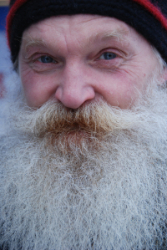Finnish, Tornedalen in Sweden

Photo Source:
Let Ideas Compete - Flickr
Creative Commons
|
Send Joshua Project a map of this people group.
|
| People Name: | Finnish, Tornedalen |
| Country: | Sweden |
| 10/40 Window: | No |
| Population: | 35,000 |
| World Population: | 74,000 |
| Primary Language: | Finnish, Tornedalen |
| Primary Religion: | Christianity |
| Christian Adherents: | 84.00 % |
| Evangelicals: | 12.10 % |
| Scripture: | Portions |
| Ministry Resources: | No |
| Jesus Film: | No |
| Audio Recordings: | No |
| People Cluster: | Finno-Ugric, Saami |
| Affinity Bloc: | Eurasian Peoples |
| Progress Level: |
|
Introduction / History
The Tornedalen Finnish people speak Tornedalen Finnish, a language closely related to Finnish but influenced by Swedish due to centuries of cultural interaction. It developed in the Torne River Valley, which spans northern Sweden and Finland, and has been spoken for generations. Despite pressures of cultural assimilation, especially during the 20th century when Swedish-only policies were enforced in schools, the Tornedalen Finnish have preserved their distinct linguistic and cultural identity.Meänkieli was officially recognized as a minority language in Sweden in 2000, and efforts continue to promote its use in education, media, and public life.
What Are Their Lives Like?
The Tornedalen Finnish people primarily live in rural communities along the Torne River Valley, including towns like Haparanda, Pajala, and Övertorneå. Traditional livelihoods such as farming, fishing, and reindeer herding remain important, though many also work in tourism, education, and public services. Strong family ties, local traditions, and a deep connection to the land mark community life.Modernization and urban migration have impacted younger generations, but cultural festivals, local media, and language initiatives help maintain community cohesion.
What Are Their Beliefs?
Most Tornedalen Finnish people are Lutheran Christians, reflecting the historical influence of Sweden's state church. Churches in the region often serve as community centers, hosting both religious and cultural events. While Christianity is dominant, some individuals also retain elements of Sámi spiritual practices, especially in areas where Sámi and Tornedalen cultures intersect.
What Are Their Needs?
While many identify as Christian, there is a need for deeper engagement with Scripture and culturally relevant discipleship programs that will lead to widespread discipleship.Rural communities need development opportunities that respect traditional lifestyles while offering sustainable livelihoods.
Prayer Points
Pray for strong discipleship programs that help Tornedalen Finnish believers grow in faith and lead others with cultural sensitivity.Pray for some to become part of the effort to take Christ to the uttermost parts of the earth.Intercede for economic development initiatives that align with traditional values and provide sustainable growth.Pray for healing from historical marginalization, that the Tornedalen Finnish would experience restoration and dignity.